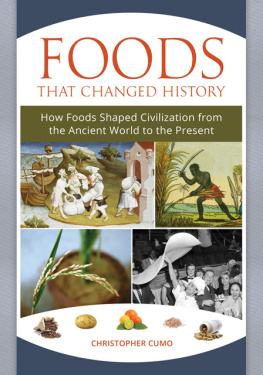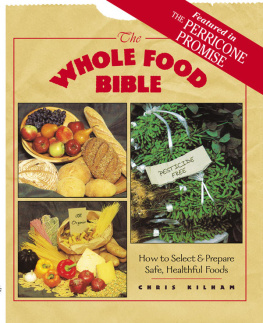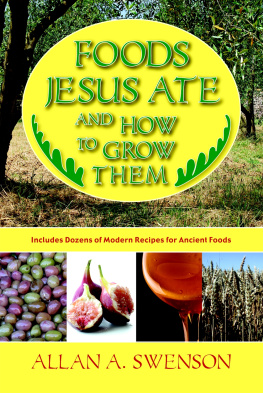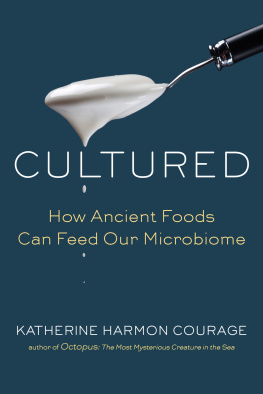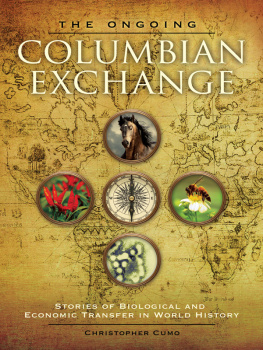Christopher Cumo - Foods That Changed History: How Foods Shaped Civilization from the Ancient World to the Present
Here you can read online Christopher Cumo - Foods That Changed History: How Foods Shaped Civilization from the Ancient World to the Present full text of the book (entire story) in english for free. Download pdf and epub, get meaning, cover and reviews about this ebook. year: 2015, publisher: ABC-CLIO, genre: Romance novel. Description of the work, (preface) as well as reviews are available. Best literature library LitArk.com created for fans of good reading and offers a wide selection of genres:
Romance novel
Science fiction
Adventure
Detective
Science
History
Home and family
Prose
Art
Politics
Computer
Non-fiction
Religion
Business
Children
Humor
Choose a favorite category and find really read worthwhile books. Enjoy immersion in the world of imagination, feel the emotions of the characters or learn something new for yourself, make an fascinating discovery.
- Book:Foods That Changed History: How Foods Shaped Civilization from the Ancient World to the Present
- Author:
- Publisher:ABC-CLIO
- Genre:
- Year:2015
- Rating:4 / 5
- Favourites:Add to favourites
- Your mark:
- 80
- 1
- 2
- 3
- 4
- 5
Foods That Changed History: How Foods Shaped Civilization from the Ancient World to the Present: summary, description and annotation
We offer to read an annotation, description, summary or preface (depends on what the author of the book "Foods That Changed History: How Foods Shaped Civilization from the Ancient World to the Present" wrote himself). If you haven't found the necessary information about the book — write in the comments, we will try to find it.
Foods That Changed History: How Foods Shaped Civilization from the Ancient World to the Present — read online for free the complete book (whole text) full work
Below is the text of the book, divided by pages. System saving the place of the last page read, allows you to conveniently read the book "Foods That Changed History: How Foods Shaped Civilization from the Ancient World to the Present" online for free, without having to search again every time where you left off. Put a bookmark, and you can go to the page where you finished reading at any time.
Font size:
Interval:
Bookmark:


Copyright 2015 by ABC-CLIO, LLC
All rights reserved. No part of this publication may be reproduced, stored in a retrieval system, or transmitted, in any form or by any means, electronic, mechanical, photocopying, recording, or otherwise, except for the inclusion of brief quotations in a review, without prior permission in writing from the publisher.
Library of Congress Cataloging-in-Publication Data
Cumo, Christopher.
Foods that changed history : how foods shaped civilization from the ancient world to the present / Christopher Cumo.
pages cm
Includes bibliographical references and index.
ISBN 978-1-4408-3536-0 (alk. paper)ISBN 978-1-4408-3537-7 (ebook) 1. FoodHistoryEncyclopedias. 2. AgricultureHistoryEncyclopedias. 3. CookingHistoryEncyclopedias. 4. CivilizationHistoryEncyclopedias. I. Title.
TX349.C86 2015
641.3003dc23 2015000810
ISBN: 978-1-4408-3536-0
EISBN: 978-1-4408-3537-7
19 18 17 16 15 1 2 3 4 5
This book is also available on the World Wide Web as an eBook.
Visit www.abc-clio.com for details.
ABC-CLIO, LLC
130 Cremona Drive, P.O. Box 1911
Santa Barbara, California 93116-1911
This book is printed on acid-free paper ![]()
Manufactured in the United States of America
Contents
Alphabetical List of Entries
Topical List of Entries
Plant Based Foods
Animal Based Foods
Beverages as Food
Composite Foods
Sweeteners
Condiments
Fungus
Preface
This encyclopedia, Foods That Changed History: How Foods Shaped Civilization from the Ancient World to the Present, aims to introduce students to the vast and trendy field of food studies. It is an important discipline that complements the study of global history, botany, animal husbandry, culinary traditions, and other fields. Within this field, this work aims to focus attention on the many foods that have shaped world history, attended the rise of monotheism and other religions, spurred the rise of civilizations, and forged culinary habits for centuries, if not millennia. Fish, for example, are tied to the canonical Gospels and have come to symbolize Jesus. In this context, they helped spur the rise of Christianity. The potato affected numerous fields of study: plant pathology, demography, a prelude to the Malthusian crisis, warfare, the decline of bread in northern Europe, and other developments. The Columbian Exchange has made the Andean potato a global staple in temperate zones. Sugarcane and coffee were the initial impetus for the rise of African slavery in the American tropics. This topic is full of perils, giving rise to racism and all the evils of slavery. Because blackness was conflated with slavery, a whole system of inferiority and exploitation attended the rise of slavery. Even a branch of pseudoscience emerged to try to prove the innate inferiority of Africans. In this case racism corrupted science, which was advertised to be objective. Mutton and lamb fueled the rise of Judaism and are the subjects of notable passages in the Old Testament, particularly the plagues upon Egypt that Exodus professes to record. The fig, apple, and banana may be at the core of the Genesis creation account, each acting as the putative forbidden fruit, at least according to some scholars. One might multiply examples, but the point is that these foods and others had a disproportionate effect on the world. They shaped what we read and think. They have, in a real sense, shaped who we are as a species. Indeed, the study of food has shaped our own evolution and that of our close kin Neanderthals. Popular imagination views Neanderthals as having been crude and primitive. This stereotype could not be more wrong. They were creative, gifted, and intelligent people whose story is bound up in the rise of fishing among anatomically modern humans during about the last 40,000 years or so.
The scope of this encyclopedia covers a range of disciplines, geographies, and foods. The nearly 100 entries span a large range of foods from the fish, beef, chicken, and mutton and lamb of prehistory to the Coca-Cola of the modern era. This wide-ranging treatment necessarily covers all the habitable continents, from the first stirrings of wheat and barley culture in southwestern Asia some 10,000 years ago to the meteoric rise of hamburgers and hot dogs in modern America. These foods have left a deep imprint. Fish, a food of sustenance for the earliest humans, has led to overfishing and ecological crisis. The very fecundity of our food production and processing system has led to a global population of some 7 billion people, leading to the specter of a Malthusian Crisis, a danger that the Irish Potato Famine in the 1840s may prefigure. Such a large population only reinforces the degree to which a prodigious food supply is essential to survival. Food is essential to all animals. We are the species that strains under the burden of the food supply, perhaps more than many other species. This was a struggle that British cleric Thomas Malthus predicted in the 18th century, and the problem has only worsened with the passage of time. Indeed, the Green Revolution, important as it was, has granted humans only a temporary buffer zone against the implacable limits of our food supply. Some dour scientists fear that some of the foods on which humans depend, rice being a good example, are near their biological limit in producing edible biomass. How, in such a context, will we derive more food to feed ever more people?
This encyclopedia has an alphabetical organization, an aid to readers who may easily find the foods of their choice. Each entry treats a single food in the context of how that food has changed history and performed the other functions outlined earlier in this preface. The treatment of each entry is chronological. Where possible, each subsection treats a way in which the food has shaped the world. The emphasis is not only on history, but also on botany, aquaculture, animal husbandry, social cohesion, competition for scarce resources, human evolution, and a variety of other disciplines. This encyclopedia is thus a multidisciplinary undertaking that relies on the humanities, the social sciences, and the natural sciences. Each entry closes with suggestions for further exploration: books, articles, and websites that enhance the readers knowledge. Foods That Changed History begins with a list of entries arranged alphabetically, as mentioned above, along with a list of entries grouped in topical categories to help users identify entries on related topics. The encyclopedia has a timeline and an introductory essay that overviews how foods changed world history. The encyclopedia closes with a selected, general bibliography of print and electronic resources to support student research.
Introduction
The acquisition of food is basic to all life. Early in the tenure of life on earth arose green algae, some bacteria, and ultimately plants capable of producing food in the form of the sugar glucose by harnessing the energy of sunlight. These organisms combined sunlight, carbon dioxide, and water to yield this sugar. Almost all other life, including humans, depends on plants for food. This dependence is direct when a person eats a plant or part of a plant, say, a potato, which is an underground tuber of the potato plant. This dependence is a step removed when humans eat the herbivores that have in turn gotten their energy from plants, say, when people eat beef, pork, or any of a number of such animals.
Next pageFont size:
Interval:
Bookmark:
Similar books «Foods That Changed History: How Foods Shaped Civilization from the Ancient World to the Present»
Look at similar books to Foods That Changed History: How Foods Shaped Civilization from the Ancient World to the Present. We have selected literature similar in name and meaning in the hope of providing readers with more options to find new, interesting, not yet read works.
Discussion, reviews of the book Foods That Changed History: How Foods Shaped Civilization from the Ancient World to the Present and just readers' own opinions. Leave your comments, write what you think about the work, its meaning or the main characters. Specify what exactly you liked and what you didn't like, and why you think so.

